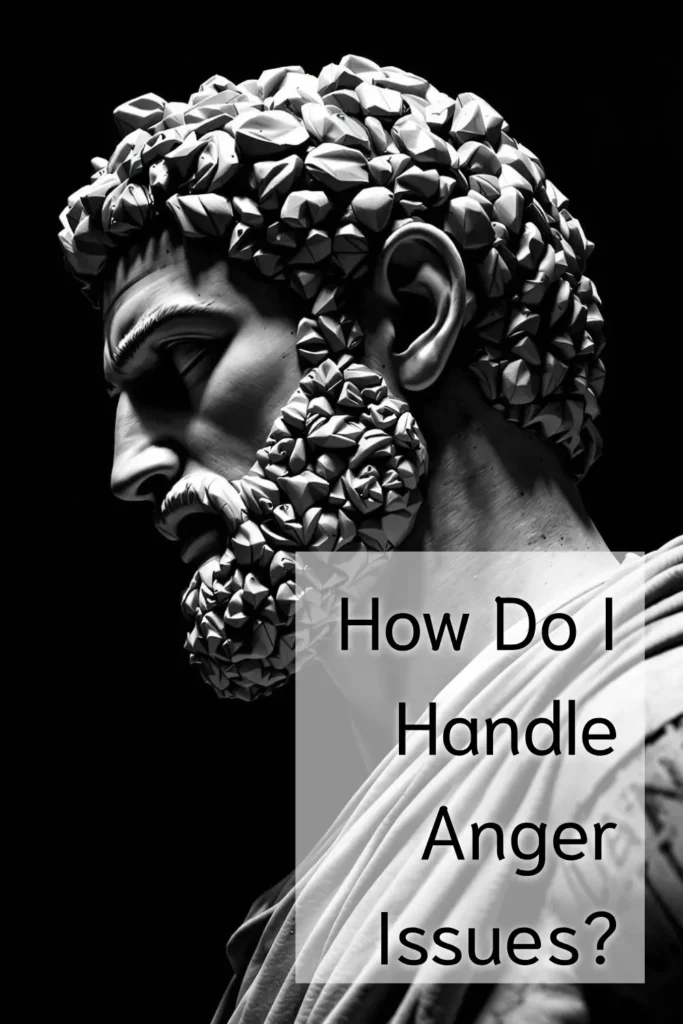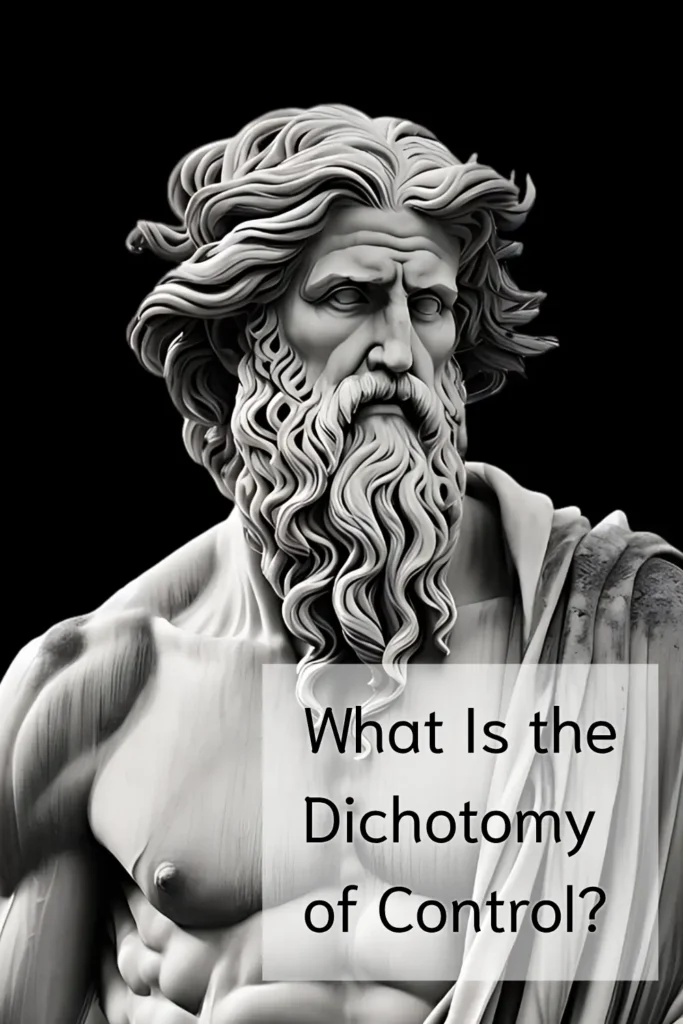The Stoic View of Anger
In the Stoic worldview, anger isn’t seen as strength. It’s seen as a sign you’ve already lost control. It’s not the fire that gives you power; it’s the fire that scorches your judgment, burns your dignity, and leaves you weaker in the end. As Seneca said in On Anger,
Anger, if not restrained, is frequently more hurtful to us than the injury that provokes it.
The Stoics didn’t fear anger; they studied it. And what they found was simple: anger is never useful. It clouds logic, makes fools of the wise, and turns otherwise disciplined people into emotional hostages. But if you’re willing to look at it through the Stoic lens, you’ll realize that most of your anger isn’t caused by events… It’s caused by expectations.
Why Do I Get Angry So Easily?
You’re probably expecting life, people, and conversations to go a certain way. And when they don’t, anger rushes in to fill the gap between what is and what you expected.
The Stoics taught that emotions aren’t problems. The real problem is our interpretation of events. Epictetus put it perfectly:
It’s not things that upset us, but our judgment about things.
Your anger doesn’t come from what they said. It comes from what you believed they meant.
Your frustration doesn’t come from what happened. It comes from what you wanted to happen instead.
In short, anger is a signal that you’re not in control of your perception.
Marcus Aurelius, in Meditations, reminds himself:
You always own the option of having no opinion.
If you can pause, observe the emotion, and shift your interpretation, you gain the ability to control your emotions instead of being dragged around by them.
How Do I Handle Anger Issues?
Anger issues aren’t always loud. Sometimes they show up in silence, resentment, tension, or the inability to let go. But for the Stoics, managing anger started with one principle:
Don’t meet fire with fire; meet it with clarity.
Seneca, in On Anger, outlined a process of slowing down the response. He advised training the mind to delay judgment, like a warrior waiting for the perfect moment instead of swinging wildly in rage. That space between stimulus and response? That’s where your power is.

Here’s a practical Stoic mindset technique you can use:
-
The Delay Rule: When you feel anger rising, don’t react. Breathe. Count slowly. Walk. Write. Speak only when your voice can match your values, not your emotions.
-
View from Above: Marcus Aurelius often imagined how small and short-lived every conflict is when seen from a bird’s-eye view. Even the perspective of the universe. If it won’t matter in 10 days, 10 months, or 10 years, it probably doesn’t deserve your explosion now.
Remember, practical Stoicism isn’t about denying feelings. It’s about not being controlled by them. Anger wants you to lose control. Stoicism wants you to take it back.
Here’s one more On Anger quote by Seneca:
My anger is more likely to do me more harm than your wrong.
The Core of Self-Control in Stoicism
In the Stoic playbook, self-control isn’t a soft skill; it’s the foundation of all power. You don’t become strong by dominating others. You become strong by dominating yourself. And the Stoics didn’t sugar-coat it: if you can’t govern your impulses, you’re already a slave to anger, to fear, to ego, to the opinions of others.
Zeno of Citium, the founder of Stoicism, taught that all virtue flows from one source: control over the self. It’s not about being emotionless. It’s about emotional command. He said:
Man conquers the world by conquering himself
What Does Self-Control Mean?
Self-control is a strength because it protects you from self-sabotage. It’s the shield between you and your worst impulses. You don’t punch a wall. You don’t send the angry text. You don’t say the thing you’ll regret. You pause, think, and respond like someone with discipline, not desperation.
Epictetus put it like this:
No man is free who is not master of himself.

Self-control is what separates reaction from response. It’s the ability to delay gratification, to let anger rise—and not ride it.
It’s not about never feeling rage or frustration. It’s about standing in the storm and not letting the storm inside you.
And no one got this better than Marcus Aurelius, who wrote in Meditations:
You have power over your mind—not outside events. Realize this, and you will find strength.
That’s the Stoic definition of strength: not in muscles or dominance, but in the quiet refusal to let emotion dictate action.
Why Do I Struggle With Self-Control?
Because you’re trying to control the wrong thing.
Most people think self-control is about forcing yourself to feel differently. But the Stoics saw that as a trap. You can’t stop yourself from feeling anger, sadness, or frustration. What you can stop is the knee-jerk reaction that follows.
Especially in relationships, this gets tested. You expect someone to text back. You expect fairness. You expect understanding. And when you don’t get it, the frustration builds.
That’s where coping with self control in a relationship gets messy, because you’re trying to fix them, when Stoicism tells you to master you.
As Epictetus taught:
Make the best use of what is in your power, and take the rest as it happens.
The power isn’t in changing others, it’s in changing your attachment to their behavior. Once you realize you don’t need their reaction to regulate your peace, you stop spiraling. And you start leading with strength, not reacting in weakness.
Why Is Self-Control So Powerful?
Because it lets you take back control over your life. Every moment you react from anger, fear, or ego, you give your power away. You become a puppet pulled by the strings of circumstance.
But when you step back, breathe, and choose your response, that’s when you start winning.
Epictetus quote:
Any person capable of angering you becomes your master; he can anger you only when you permit yourself to be disturbed by him.
Marcus Aurelius reminds himself in Meditations:
The best revenge is to be unlike him who performed the injury.
Self-control doesn’t just protect you from others. It protects you from becoming like them. That’s why it’s so powerful, rare, and freeing.
The Dichotomy of Control
One of the most powerful ideas in Stoic philosophy and the one that can change your relationship with anger immediately is the dichotomy of control. Once you understand this principle, you stop wasting energy on things that don’t belong to you.
You stop taking things personally.
You stop reacting to things that can’t be changed.
And most importantly, you stay calm even when the world tries to shake you.
What Is the Dichotomy of Control?
The Epictetus dichotomy of control is a simple but life-altering idea:
Some things are up to us. Some things are not.
This is the first line of Epictetus’s Enchiridion, and it’s the foundation of the Stoic mindset. Here’s the breakdown:
✅ Up to you: Your thoughts, your actions, your choices, your reactions.
❌ Not up to you: Other people’s opinions, the past, the weather, random outcomes, and basically 99% of the chaos around you.
Epictetus taught that suffering doesn’t come from events; it comes from wanting to control what you can’t.
There is only one way to happiness, and that is to cease worrying about things which are beyond the power of our will.

The modern mind spins out trying to fix people, force outcomes, and control perception. But the Stoic mind says: Let go of the external, master the internal. That’s the real battlefield.
So if you’re constantly thinking: “Why did they say that?”, “Why isn’t this fair?”, or “How do I make them understand?”—you’re burning energy on a fight that was never yours to begin with.
The dichotomy of control meaning, at its core, is emotional freedom. The more you accept what’s not yours, the more power you gain over what is.
How This Principle Helps You Stay Calm
When it comes to how to control your anger, the stoicism dichotomy of control is your cheat code.
Anger thrives on the illusion of control. You think someone should behave a certain way. You believe life must go as planned. And when it doesn’t, you explode. But what if you trained your mind to expect the unexpected?
Marcus Aurelius, in Meditations, often reminded himself that people would lie, insult, act selfishly, and fall short. Instead of getting mad, he prepared his mind:
You can endure anything your mind can make endurable.
The more you internalize the dichotomy, the less shaken you are by life’s noise. This doesn’t mean apathy. It means calm focus. You focus only on your lane. You leave theirs alone.
Here’s a simple Stoic tool:
When triggered, ask yourself:
Is this mine to control?
If yes—act with clarity.
If no—drop it.
That single question can silence the urge to snap back, argue, or spiral into resentment. It’s not suppression. It’s a strategy. That’s practical Stoicism in action.
The Stoics weren’t cold—they were clear. And clarity is what keeps you calm when everyone else is crumbling.
Stoic Techniques for Emotional Control
Anger will come. You’re human. But what you do next is where your power lies. The Stoics never aimed to suppress emotion—they aimed to master the response.
Whether it’s a heated argument, a disrespectful comment, or a wave of injustice hitting you in public, the Stoic toolkit is designed to make you calm, strategic, and unshakable.
How Do I Control My Anger in the Moment?
In the heat of the moment, you have two choices: react or respond. One will cost you control. The other will give it back.
The Stoics trained themselves to choose a response, always.
Marcus Aurelius, in Meditations, often reminded himself that people act out of ignorance, fear, or habit, not because they’re out to get you personally.
When you wake up in the morning, tell yourself: the people I deal with today will be meddling, ungrateful, arrogant, dishonest, jealous and surly. They are like this because they can't tell good from evil. But I have seen the beauty of good, and the ugliness of evil, and have recognized that the wrongdoer has a nature related to my own - not of the same blood and birth, but the same mind, and possessing a share of the divine. And so none of them can hurt me. No one can implicate me in ugliness. Nor can I feel angry at my relative, or hate him. We were born to work together like feet, hands and eyes, like the two rows of teeth, upper and lower. To obstruct each other is unnatural. To feel anger at someone, to turn your back on him: these are unnatural.
This isn’t negativity—it’s preparation.
Here are two simple Stoic tools to help you control your anger in real time:
The Pause Technique: When the anger hits, pause. Even one second gives you an edge. Think: Is this action worthy of the person I want to be?
Journaling-as-Discharge: Instead of exploding at someone, unload your emotions into paper. Marcus did this every night. That’s why Meditations exists. It’s a Stoic’s version of “say it, don’t send it.”
When you treat every emotional wave as a test of self-mastery, you flip the script. You don’t suppress your emotions—you lead them.
How to Control Anger During Conversation
Anger during conversation is tricky; it hits fast, it feels personal, and if you’re not trained, it wins.
But Stoic virtue says: you don’t lose composure just because they do.
Here are grounded, Stoic-backed tactics for those fire-lit dialogues:
Active Detachment: While they’re speaking, breathe slowly and observe, not just them, but yourself. Observe your body, your tension, your urge to interrupt. This is emotional intelligence at work.
Use the Delay Phrase: Say, “Let me think about that for a second.” It buys you space and shows self-command.
Drop the Ego Game: You’re not here to win, you’re here to stay in control. Temperance, one of the core Stoic virtues, reminds us: don’t speak just because you’re angry, speak only when your words improve silence.
And remember, your calm presence disarms chaos. People expect a reaction. When you stay level, they lose power. That’s real strength.
How to Remove Anger and Resentment
Let’s talk long-term.
You can’t live in anger and expect peace. If you want to free your mind, you need to learn the Stoic version of forgiveness, not the soft kind. The strategic, liberating kind.
Seneca, in On Anger, wrote:
The greatest remedy for anger is delay.
But even more powerful is release, the choice to stop carrying poison just because someone else served it to you.
Here’s how to practice that:
Reframe Their Behavior: Maybe they were weak. Maybe they were ignorant. Maybe they were hurting. But they no longer get to live rent-free in your head.
Write and Burn: Journal the resentment. Get it all out. Then destroy it. You’re not suppressing. You’re purging, just like the Stoics did in their private writings.
Forgiveness, in Stoicism, isn’t about excusing their actions. It’s about protecting your energy. You remove anger not because they deserve peace, but because you do.
If you hold on to resentment, you’re still letting the past control you.
Letting go? That’s Stoic freedom.
Training the Mind Like a Stoic
Building a Stoic mindset isn’t a weekend project. It’s a lifelong discipline, one where you rewire your reactions, reshape your thoughts and harden your emotional armor day by day. Anger, overthinking, insecurity, they don’t disappear because you decide to be Stoic. They dissolve because you train your mind like a Stoic.
How Do I Stop Being So Angry—For Good?
If you’ve ever thought, “I can’t control my anger,” you’re not weak—you’re untrained. That’s how the Stoics saw it.
Zeno of Citium, the founder of Stoicism, taught that a strong mind is shaped by daily practice. He believed that emotion, especially anger, is not a beast to kill but a habit to unlearn. Stoicism doesn’t shame you for your outbursts. It challenges you to build better patterns.
Instead of suppressing rage, train your response. Don’t yell, pause. Don’t react, observe. Don’t escape, understand. Anger loses its grip when your self-awareness grows stronger than your triggers.
Epictetus wisdom:
No man is free who is not master of himself.
Daily Practices to Build Mental Armor
So, what is the Stoic mindset in daily life? It’s not emotionless. It’s emotionally disciplined. It’s not about controlling the world, it’s about controlling how you respond to it.
Here’s how to build that mental armor every day:
Morning preparation – Start your day like Marcus Aurelius: remind yourself that setbacks, rudeness, and discomfort are part of life. Expect it, don’t be shocked by it.
Voluntary discomfort – Practice walking when you could ride, fasting when you could feast, or enduring cold when you could avoid it. These small hardships toughen the mind.
Evening reflection – Before bed, ask: Where did I lose my temper? Where was I strong? What did I learn? This is how you become your coach, not your critic.
Each day isn’t just a test; it’s training. One quiet decision at a time, you build the kind of inner strength that doesn’t flinch when life gets loud. As Marcus put it:
You have power over your mind—not outside events. Realize this, and you will find strength.
What the Stoics Would Tell You Today
It’s fascinating to imagine how famous Stoics like Marcus Aurelius, Seneca, or Zeno would handle today’s world. How would they respond to everyday problems like being stuck in traffic or running out of sugar for their cocoa? Probably not like most people in our world do. I’ll admit that some days I don’t react in a very Stoic way myself. But the more I learn about Stoicism, write about it, and create videos on Stoic philosophy, the more I find myself applying it to my daily challenges. It’s not easy, but I suppose that kind of wisdom comes with time and experience.
Marcus Aurelius: "You Could Leave Life Right Now..."
You could leave life right now. Let that determine what you do and say and think.
Well, this is Memento Mori wisdom. This isn’t a death sentence—it’s a wake-up call. If you knew your time was limited (because it is), you’d stop wasting it on petty arguments, overthinking, and chasing validation.
Marcus Aurelius didn’t write for fame. He wrote to remind himself: every moment you’re breathing is a moment to live better.
Seneca: "We Suffer More in Imagination Than in Reality"
We suffer more often in imagination than in reality.
Seneca knew exactly what overthinking feels like—because humans haven’t changed. That text you overanalyze? That meeting you dread? That “what if” looping in your head?
None of it is real until it happens. And most of it won’t happen.
The mind creates fake emergencies and feeds your anxiety. Seneca’s solution? Stay anchored in what is, not what might be. That’s how peace begins.
Epictetus: "It's Not What Happens to You..."
It’s not what happens to you, but how you react to it that matters.
Epictetus was born a slave and still ended up teaching emperors. Why? Because he understood one truth: no one can control your mind unless you hand it to them.
If someone insults you, you have two options: absorb it or observe it. If life tests you, break down or build discipline.
Your response is your power. That’s the Stoic way.
These Stoic Quotes Aren’t Just Words—They’re Warnings
These Stoic quotes were written in blood, sweat, war, exile, and silence. They’re not soft. They’re sharp.
Each quote is a mirror—asking: Are you really living, or are you just reacting? Are you in control, or are you running from discomfort?
The Stoics didn’t speak to impress. They spoke to awaken.
Walk Away Like a Philosopher
Anyone can explode. Anyone can yell, slam doors, post paragraphs, and burn bridges. That’s easy.
But walking away calm? That’s rare. That’s power.
When you stay in control, you don’t lose the fight; you win without swinging. The Stoics didn’t avoid anger because they were weak. They avoided it because they refused to give anyone else that much control over their mind. And if you want to learn how to control your anger, it starts with one question: Who’s really in charge here—your emotions or your reason?
As Seneca once said,
“The greatest remedy for anger is delay.”
Translation? Breathe. Think. Detach. Then decide. That pause is where emotional intelligence is born.
You don’t need revenge. You need resolve. You don’t need the last word. You need inner peace.
Because self control is strength, not screaming. Not clapping back. Not proving a point. Strength is being so rooted that chaos can’t move you.
So next time anger shows up at your doorstep, don’t invite it in. Just nod, walk away, and let your silence say everything.
That’s how real philosophers move.
Quiet. Sharp. Untouchable.





